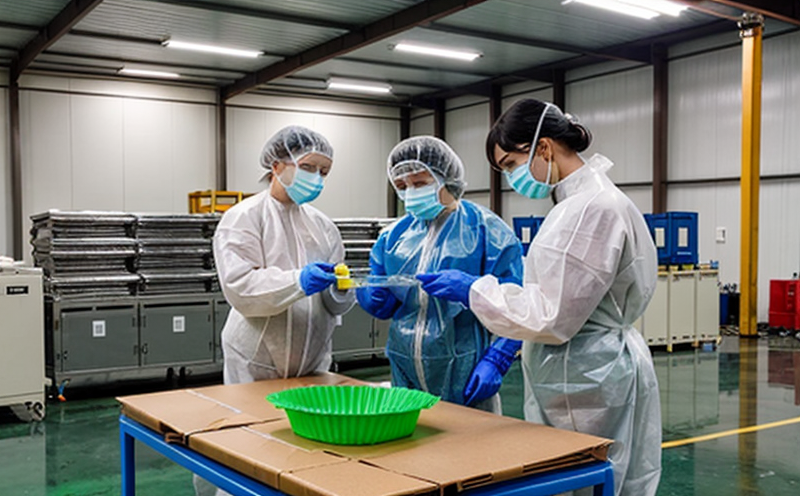ISO 2233 Mechanical Load Testing
The ISO 2233 standard specifies requirements and methods for mechanical load testing of plastic packaging. This method is essential to ensure that plastic packages can withstand the mechanical stresses encountered during handling, storage, and transportation without compromising their integrity or safety.
When conducting ISO 2233 tests, it's critical to understand that these are not just simple tensile strength tests but a comprehensive evaluation of how well the packaging will perform under various loading conditions. The standard includes several key aspects: specimen preparation, test setup, loading configurations, and acceptance criteria.
Specimen preparation involves selecting representative samples from the production batch. These samples must be cut to specific dimensions as per ISO 2233 guidelines to ensure consistency across all tests. The specimens are then conditioned under controlled environmental conditions before testing begins.
The test setup typically includes a loading machine capable of applying axial loads in a controlled manner. Load cells accurately measure the applied force, and displacement sensors monitor any deformation. Testing can be done with different types of loads such as tensile, compressive, and shear forces, depending on the packaging design.
Acceptance criteria are stringent to ensure that only reliable packages pass. For instance, if a package is designed to contain fragile products, it must demonstrate sufficient resistance to impact or vibration without damage. Similarly, for load-bearing applications, the package should maintain its structural integrity under specified load conditions.
- Specimen dimensions must adhere strictly to ISO 2233 specifications
- Environmental conditioning ensures consistency in test results
- Loading machines must be calibrated and validated against international standards
- Data acquisition systems should provide real-time monitoring of force and displacement
The importance of this testing cannot be overstated. It helps manufacturers identify potential weaknesses early in the design process, ensuring that products reach the market safely and efficiently.
For example, a retailer might require mechanical load testing to ensure that new packaging can handle the weight of heavy items like electronics or large glass bottles without breaking during transit. By adhering to ISO 2233 standards, manufacturers can meet these requirements confidently while also ensuring compliance with local regulations.
Furthermore, this test is crucial for ensuring product safety and environmental sustainability. Fragile packages that fail mechanical load tests may cause damage to contents or waste resources if they break during handling. By conducting thorough testing upfront, companies reduce the likelihood of such issues occurring in the field.
In summary, ISO 2233 Mechanical Load Testing is a vital component of any comprehensive quality assurance program for plastic packaging. It provides valuable insights into how well your products will perform under real-world conditions and helps maintain high standards across all stages of development.
Benefits
The benefits of ISO 2233 Mechanical Load Testing extend beyond mere compliance with industry standards. Here are some key advantages:
- Improved Product Quality: Ensures that all packaging units meet the required mechanical strength and durability.
- Enhanced Safety: Reduces risks associated with failed packages causing damage to contents or injuries during handling.
- Sustained Compliance: Helps maintain ongoing regulatory compliance, avoiding costly penalties and potential product recalls.
- Informed Decision-Making: Provides data-driven insights that inform design improvements and cost-effective solutions.
These benefits collectively contribute to a more efficient supply chain and enhanced customer satisfaction. By investing in ISO 2233 Mechanical Load Testing, businesses can achieve these outcomes while also promoting sustainability practices like reducing waste through optimized packaging designs.
Eurolab Advantages
EuroLab offers unparalleled expertise and state-of-the-art facilities for conducting ISO 2233 Mechanical Load Testing. Our team of certified professionals ensures that every aspect of the testing process adheres strictly to international standards.
- Comprehensive Capabilities: We provide a full range of mechanical load testing services tailored specifically for plastic packaging.
- Absolutely Accurate Results: Our lab uses cutting-edge equipment calibrated against global benchmarks to deliver precise measurements and detailed reports.
- Expert Guidance: Our experienced technicians offer valuable input throughout the testing process, ensuring optimal results for your specific needs.
- Fast Turnaround Times: We understand the importance of timely delivery, so our labs are designed to handle projects efficiently without compromising quality.
By choosing Eurolab for your ISO 2233 Mechanical Load Testing requirements, you gain access to a wealth of resources and expertise that can significantly enhance your product development process. Whether you're a small startup or an established corporation, our commitment to excellence ensures that every project receives the attention it deserves.
Quality and Reliability Assurance
- Consistent Testing: Ensures uniformity in testing methods across all samples, leading to more reliable outcomes.
- Data Integrity: Maintains accurate records of test conditions, results, and interpretations for future reference or audits.
- Continuous Improvement: Identifies areas where current practices can be enhanced based on tested data.
- Regulatory Compliance: Helps ensure that all products meet applicable international standards and local regulations.
The rigorous nature of ISO 2233 testing contributes significantly to overall quality assurance efforts. By identifying potential issues early in the design process, companies can implement corrective actions promptly, thereby reducing risks associated with defective packages reaching consumers or end-users.





